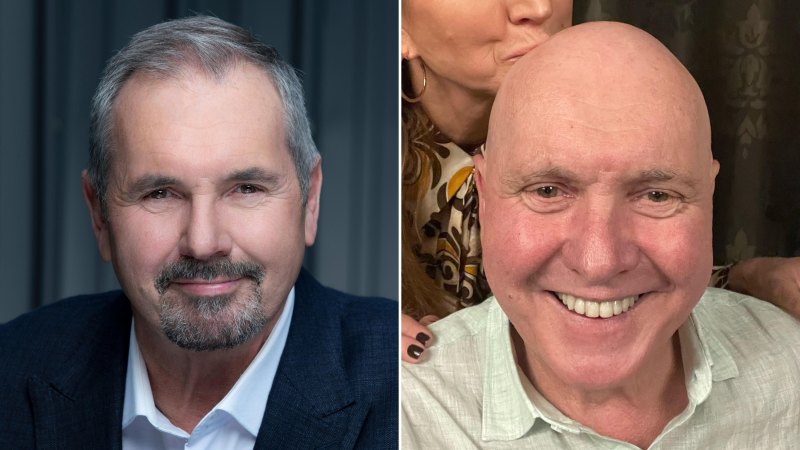Save articles for later
Add articles to your saved list and come back to them any time.
In February last year, Neighbours star Alan Fletcher found his hair rapidly disappearing. Although it’s far from unusual for men in their 60s to experience hair loss, the accelerated rate at which the actor’s hair vanished from all over his body triggered alarm bells.
“There was a lot of hair in my basin. It became noticeable fairly quickly on air,” Fletcher says. “We were able to cover some of the lost hair using make-up methods, but by the last day of filming there was no hair anywhere.”
Alan Fletcher is best known for his role as Dr Karl Kennedy on Neighbours.
As it turns out, this was not a case of male pattern baldness. Cells in Fletcher’s immune system were mistaking his hair follicles as foreign and viciously attacking them, causing swift and severe hair loss. This autoimmune disease is called alopecia areata, and it affects Australians of all ages and genders, with about 7400 new cases arising each year.
“I got myself to a dermatologist very quickly and they diagnosed it immediately,” the actor says. By June 2022, he had no eyebrows, no eyelashes and almost no body hair left.
But looking at Fletcher today, you’d never know he’d been through this only a year ago. “My hair now is close to what it was before I started to lose it, I’ve gained my beard and eyebrows back.” His recovery, he says, is thanks to baricitinib, a JAK inhibitor commonly used to treat rheumatoid arthritis.
Although the drug was not approved for the treatment of alopecia in Australia at the time, Fletcher was able to access it through Rodney Sinclair, a professor of dermatology at the University of Melbourne, one of the world leaders in alopecia research and an authorised prescriber through the Therapeutic Goods Administration (TGA) special access scheme.
“The results appeared quite rapidly,” Fletcher says. “I’ve been taking this since July last year and will probably be on it for some time.”
The breakthrough discovery of baricitinib as an effective treatment for alopecia areata was spearheaded by geneticist Professor Angela Christiano at Columbia University, who developed the disease herself at 30 years old.
“I was fixed with the same challenges that many patients have; hearing, ‘We don’t know what causes it and there’s not much we can do except inject steroids into your scalp and hope for the best’,” she says. “When I started digging around myself, it was very clear there was little known about the genetics of the disease.”
This was the catalyst for 25 years of research by Christiano and her team at Columbia, amounting to the Food and Drug Administration approval of baricitinib for the treatment of alopecia areata in the United States in June last year.
Now it’s Australia’s turn. After decades of tireless work from Sinclair, Christiano and their respected research teams, the TGA announced the approval of baricitinib for treatment of alopecia areata from May 18, 2023 – a massive breakthrough for Australians living with the condition.
Prior to the discovery of JAK inhibitors as an effective treatment, frequent steroid injections were often the only option available for patients with alopecia areata, many getting between 100 and 200 in their scalp every six weeks. With severe cases such as Fletcher’s, it was rare to see results.
It’s not just the physical toll of recovery that can be difficult – it’s also the emotional one. “People find that when they don’t get job opportunities or they don’t get promotions … they’re always left wondering if it’s because of the way they look,” says Sinclair. “If we get in early, we should be able to help the vast majority of people with these medications.”
According to Sinclair, the common misconception that wearing a wig would solve these insecurities profoundly underestimates the stress caused by the disease.
Christiano has witnessed firsthand what the approval of this drug can mean for patients. “People have been very descriptive [telling me], ‘You gave me my life back, you gave my child their life back’. It’s really a privilege to have had a little to do with getting that in their hands” she says. “It’s such an important part of their identity … Just a little bit of hair growth in crucial areas like the eyebrows can be life-changing.”
The TGA doesn’t approve any JAK inhibitors for use on patients under the age of 18, but Sinclair is finding success trialling them on children as young as 12.
“Response rates are very high in children as they generally have a shorter disease duration,” he says. “In the schoolground, people bully the kids who look different, we’ve got a lot of school avoidance and we even reported on suicide in children as a result of their alopecia areata.”
Fletcher has also encountered this since going public with his diagnosis. “Most people reaching out are the parents of children who have alopecia,” he says. “It’s caused them a great deal of distress”.
When it comes to financial accessibility, the newly approved treatment still has a long way to go. “We’ve got another big step and that’s to convince the government to pay for it because without PBS (Pharmaceutical Benefits Scheme) reimbursement people will be selling their cars and selling their house to get the treatment,” says Sinclair.
“The government already subsidises this drug for a whole range of other diseases – now we’ve got to persuade them that alopecia areata is also worthwhile.”
Make the most of your health, relationships, fitness and nutrition with our Live Well newsletter. Get it in your inbox every Monday.
Most Viewed in Lifestyle
From our partners
Source: Read Full Article

